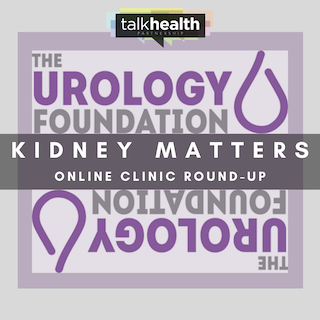talkhealth and The Urology Foundation answer all of your kidney-relateds questions!

When a kidney is not working properly it can cause discomfort and sometimes even serious illness. Although the bean-shaped organs play a vital role in filtering our blood and keeping us well, lots of people neglect them.
Leading experts Joe Philp and Ken Anson took up residence at the talkhealth clinic to give advice and information about kidney health. They covered kidney stones, UTIs, diabetes and the menopause.
If you missed the clinic, here are some of our member’s best questions:
Over the last few months I have had constant low-grade pain in my side, could this be kidney related?
The most common cause of pain in this area is often related to the muscles and bones of the back but of course, kidney pain could be the cause as well. It could be kidney stones and your GP could check your urine and examine you to try to establish the cause.
The three likely conditions I consider when my patients report back pain are: stone disease, musculoskeletal conditions and bowel-related problems. It would be worthwhile having a discussion with your doctor, even if it's a telephone consultation, to begin with.
What is a kidney stone?
A kidney stone is a crystallisation of some constituents of your urine into a solid stone. These can be small or large and often do not cause any symptoms. We are increasingly finding them as "incidental findings " when patients are having scans for other problems.
Patients can experience pain if the stone moves out of the kidney into the tube between it and the bladder (the ureter). Stones can cause blood in the urine, urinary infection, intermittent back pain (below the ribs and one side or the other but not typically in the middle of the back) and can lead to kidney damage. Sometimes the drainage of the kidney is blocked for a while.
Do you have to have kidney stones removed or do they pass through naturally?
As far as treatment is concerned the majority of stones 'on the move’ will pass spontaneously. We need to treat them if they are too big, if the pain is dreadful and not controlled, if they cause infection, or if they are threatening to damage the kidney.
Small stones should and can pass. Stones that do not pass and/or are considered too large to pass can be treated with ultrasound shock waves that fragment the stone or surgical treatment either through the urethra (wee pipe) or keyhole into the kidney for larger stones.
What are the common signs or symptoms someone would experience if they had undiagnosed problems with their kidneys?
Patients with kidney disease or kidney problems often show no symptoms unless the kidneys are failing dramatically. Abnormalities are usually picked up in a blood test. These should be regularly monitored in patients at risk of developing kidney problems. Those more at risk include: diabetics, hypertensives, those on certain medications and those with urinary stone disease.
Of course, you can experience kidney pain, in the back area below the ribs on each side, with kidney stones and infection.
I am 70 and have had persistent UTIs for around 13 years. What can I do?
I am presuming that you are post-menopausal. Assuming that your kidneys and bladder are OK, then the most common cause of UTIs in a lady of your age is related to vaginal health. This deteriorates as the oestrogen levels fall after the menopause and can lead to a loss of your resistance to UTIs.
Ask your GP for a vaginal assessment as topical oestrogen therapy can be very beneficial. Also, a high fluid intake is critical to reducing your risk, this must be maintained when you are infection-free. Stay confident in the knowledge that uncomplicated bladder infections do not cause kidney damage in adults.
Could borderline type 2 diabetes be damaging my kidneys?
Almost certainly not at such an early stage. Long-standing diabetes can affect kidney function if your control is poor as it can lead to damage of the small blood vessels in the kidney. Good diabetic control over many years is the secret to reducing your risks. Your primary care team should keep an eye on your kidney function over the years.
If you, or someone you know, need more support for urinary issues our talkbladder health hub is always open!
Information contained in this Articles page has been written by talkhealth based on available medical evidence. The content however should never be considered a substitute for medical advice. You should always seek medical advice before changing your treatment routine. talkhealth does not endorse any specific products, brands or treatments.
Information written by the talkhealth team
Last revised: 3 March 2021
Next review: 3 March 2024
